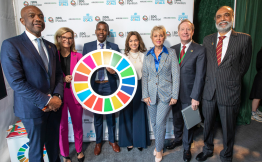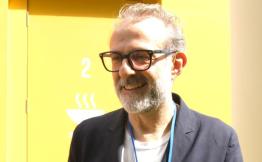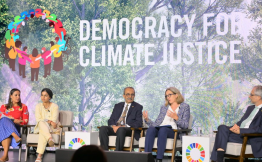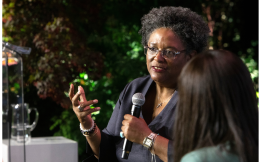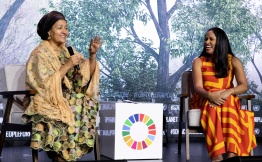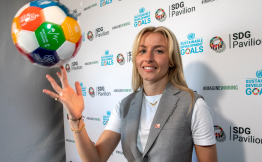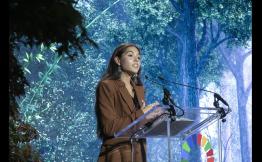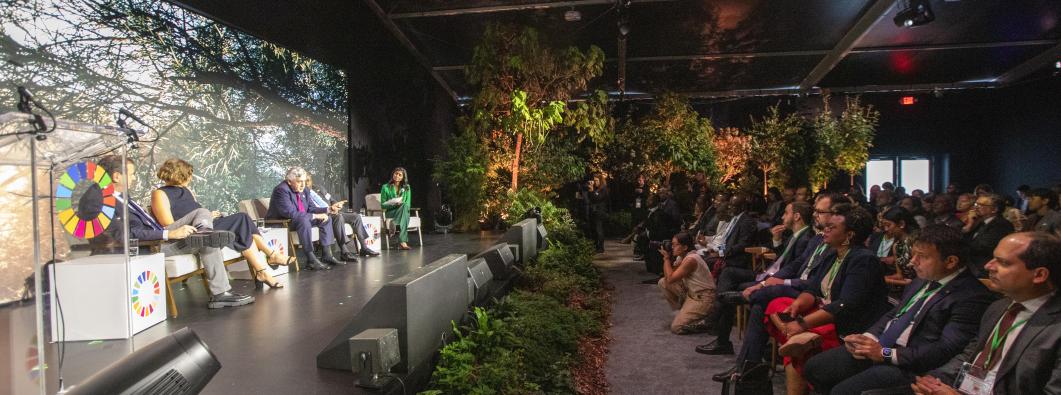
SDGs in the Second Half
The Monday morning event in the SDG Pavilion opened with a look ahead to the years that remain until the 2030 Sustainable Development Goals deadline. World leaders and experts discussed the trends and forces affecting the Goals, and how solutions can be scaled up for people and the planet.
The session began with a panel discussion, chaired by Sumi Somaskanda, a senior BBC News presenter, on the biggest challenges facing the SDGs, and what needs to happen, in terms of interventions, partnerships and strategies, to achieve them.
Nana Akufo-Addo, the President of Ghana, and Co-chair of the SDG Advocate Emeritus Group, was joined on the panel by Eduardo Paes, the Mayor of Rio de Janeiro, and Mariana Mazzucato, Professor of the Economics of Innovation and Public Value at University College London.
“Up until now, the world has been created on the principle that, for me to be wealthy, you must be poor,” declared President Akufo-Addo. “Is it possible for all of us eight billion people on this planet to be able to live and make use of its resources in such a way that we can all be comfortable?” Financing is needed to resolve the climate crisis, he concluded, and develop green economies.
On behalf of the international community, Gordon Brown apologized to Africa for allowing people to die, by failing to transfer available vaccines. “We let the hungry starve through failing to transfer available food; and we’re letting droughts and floods destroy people’s lives, because we’re not transferring the resources that we promised for climate finance and climate change.” Mr. Brown called for coordinated action, at a global level, so that the countries with the capacity to pay – the historic emitters – finance their fair share.
Professor Mazzucato objected to the description of a financing gap: “Anytime anything is addressed as a gap, you’re just filling a hole, as opposed to asking, ‘where did that hole come from?’”. Rather than thinking of market failures, she called for the creation of a different type of economy that is truly inclusive and sustainable.
The panel was followed by a demonstration – from Stefan Schweinfest, Director of the UN Statistics Division and Brigitte Hoyer Gosselink, Director of Product Impact at Google.org – of a new data tool that can visualize the progress of the SDGs.
“At the halfway point of the SDGs, data has never been more important,” said Mr. Schweinfest. “We need robust, authoritative data to understand where it’s most urgent to take action in the second half.”
Ms. Gosselink explained that, by making date truly accessible, nonprofits, policy makers, and the public can get the insights they need to make decisions that are rooted in a deep understanding of the issues they face, and the underlying problems that are driving them.
The session concluded with a deep dive into food systems, which stand at the heart of many SDGs, affecting climate change, the state of hunger, poverty, economic growth, and inequalities.
The speakers were Agnes Kalibata, the President of Agra, an organization focused on sustainably growing Africa’s food systems, and Special Envoy for the 2021 UN Food Systems Summit; Stefanos Fotiou, Director of the SDG office at the Food and Agriculture Organization (FAO); and Lana Weidgenant, Campaigns and Policy Manager at ProVeg International, a food awareness organization working to transform the global food system.
They discussed the policy changes that could make food systems more resilient, and some of the daily practices that people can make to reduce the impact the food production and consumption have on the environment.
Ms. Kalibata emphasized the importance of local solutions, increasing diversity in food systems, and accountability for the loss and damage that is being created by the climate crisis. The global community, she said, needs to fix the problem, which is “leading to hunger, death, and the destruction of life as we know it.”
The theme of accountability was picked up by Mr Fotiou, who said that the issue should be looked at more broadly. “Why are we always asking for accountability only from the governments?”, he asked. “We need to ask for accountability from the private sector, because actually it’s the private sector that is profiting from the consumption of the people.”
Ms. Weidgenant’s organization, ProVeg International, campaigns for a reduction in meat consumption. She called for a food system that has less industrial animal agriculture, less deforestation, and more sustainable, healthy, and plant-rich consumption, particularly in Global North countries like the United States, Western Europe, and Australia.
Watch the session again [HERE]




